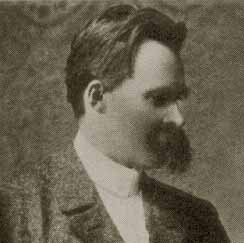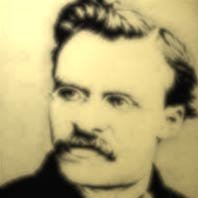Friedrich Nietzsche
 People discover this German philosopher in one of two ways: either they're forced to
read about him in school, or they're curious about all the references to "Nietzsche"
made by Monty Python.
People discover this German philosopher in one of two ways: either they're forced to
read about him in school, or they're curious about all the references to "Nietzsche"
made by Monty Python.
He was a brilliant student with rigorous training in German, Latin and Greek.
At the age of 24, Nietzsche was appointed professor of classical philology at
the University of Basel. His first book, The Birth of Tragedy, was
a series of dialogs arguing that death is perhaps the best possible thing a
human being could ever hope for. Although it garnered immediate critical acclaim,
historians consider this early work a little fumbly. He seemed to be "guesstimating"
a lot, sprinkling his text with phrases like perhaps, maybe, and what
if. It was like he had plenty of marijuana and a quality bong, but nothing
to start a real fire.
Later he'd write a book appropriately titled The Gay Science, a conversation
with numerous fictional characters who do in fact discuss how gay science is.
A "madman" in one portion of the play famously announces that God
is dead, using this simple logic:
1. Without God, humans are deprived of absolute values or eternal truths.
2. Absolute values and eternal truths rely upon the existence of God.
 Essentially
this suggests that because God can only exist due to one's own faith, the
God-fearing among us are trapped inside a chicken-and-egg infinite loop support
system from which no genuine satisfaction can ever be extracted. It was an airtight
case which fell apart when people wondered, well, if God is dead then
he must have been alive at some point. Even Monks and Buddhists took offense,
piping up from their vows of silence to declare that God played no part whatsoever
in the act of their spiritual quests. Nietzsche went on to point out that he
was not actually talking about God, but rather a fascist European political
structure. Either way, Nietzsche's hatred of Christians and religion as a general
whole would last a lifetime. He believed there simply wasn't enough love and
kindness in the world to give any of it away to imaginary beings.
Essentially
this suggests that because God can only exist due to one's own faith, the
God-fearing among us are trapped inside a chicken-and-egg infinite loop support
system from which no genuine satisfaction can ever be extracted. It was an airtight
case which fell apart when people wondered, well, if God is dead then
he must have been alive at some point. Even Monks and Buddhists took offense,
piping up from their vows of silence to declare that God played no part whatsoever
in the act of their spiritual quests. Nietzsche went on to point out that he
was not actually talking about God, but rather a fascist European political
structure. Either way, Nietzsche's hatred of Christians and religion as a general
whole would last a lifetime. He believed there simply wasn't enough love and
kindness in the world to give any of it away to imaginary beings.
By far, his masterwork was Human, All Too Human first published in
1878. This was a dense, heavy text containing piercing observations which lay
bare the hidden motivations underlying all aspects of human behavior. The book
is organized in sections like a bible. The chapters have titles like Man
Alone by Himself, Wife and Child, and Signs of Higher and Lower Culture.Each section is divided up into individual fragments of condensed information,
resembling a dictionary:
Presence of witnesses. One is twice as happy to dive after
a man who has fallen into the water if people are present who do not dare to.
The friend's secret. There will be but few people who, when
at a loss for topics of conversation, will not reveal the more secret affairs
of their friends.
Joy in old age. The thinker or artist whose better self has
fled into his works feels an almost malicious joy when he sees his body and
spirit slowly broken into and destroyed by time; it is as if he were in a corner,
watching a thief at work on his safe, all the while knowing that it is empty
and that all his treasures have been rescued.
The infuriating thing about an individual way of life. People
are always angry at anyone who chooses very individual standards for his life;
because of the extraordinary treatment which that grants to himself, they feel
degraded, like ordinary beings.
The right profession. Men seldom endure a profession if they
do not believe or persuade themselves that it is basically more important than
all others. Women do the same with their lovers.
Boredom. Many people, especially women, do not experience
boredom, because they have never learned to work properly.
 Nietzsche pounded females and several minorities in this volume, even going so far as to say that doing otherwise would be contrary to Nature. In Beyond Good and Evil, Nietzsche delivers misogynistic tirades which attack women's intellectual acumen. Indeed, Sigmund Freud often marveled how Nietzsche's hunches and insights behaved in synchronous agreement with the laborious results of academic psychoanalysis.
Nietzsche pounded females and several minorities in this volume, even going so far as to say that doing otherwise would be contrary to Nature. In Beyond Good and Evil, Nietzsche delivers misogynistic tirades which attack women's intellectual acumen. Indeed, Sigmund Freud often marveled how Nietzsche's hunches and insights behaved in synchronous agreement with the laborious results of academic psychoanalysis.
In between writing and philosophizing, Nietzsche took the time to enter into
a strange friendship with composer/musician Richard Wagner, who was more than
twice Nietzsche's age. It began well, but publicly degenerated into a bitter
intellectual and emotional feud. There existed a jealous and intensely competitive
love triangle between Nietzsche, Wagner, and Wagner's wife Cosima. Wagner could
be a manipulative brute, and the combined traumatized childhoods of Nietzsche
and Cosima bound them in submission to Wagner. Wagner would subjugate them both to seductive, emotionally abusive behavior. Wagner knew about Nietzsche's
secret life as a homosexual, and Nietzsche continued to obsess over this fact
long after Wagner's death.
In January of 1889, Nietzsche collapsed on a street in Turin, Italy - rapidly descending into insanity. Some blame syphilis, which wouldn't have anything resembling a cure for many years. He remained in a state of mental and physical paralysis until his death. Nietzsche's sister ended up with control over his books and papers intended for publication. She hated the Jews more than anything else, and she worked hard to ensure that Nietzsche's legacy would be used to fund the Nazi regime. Maybe that's what Monty Python finds so funny.
Timeline
| 15 Oct 1844 |
Friedrich Nietzsche born, Röcken, on the outskirts of Lützen, Province of Saxony. |
| 30 Jul 1849 |
Nietzsche's father dies of a brain tumor. |
| 8 Nov 1868 |
Meets Richard Wagner, Leipzig, Germany. |
| Feb 1869 |
Appointed Professor of Classical Philology, University of Basel. |
| 1872 |
The Birth of Tragedy. |
| 1873-6 |
Untimely Meditations. |
| 1878-9 |
Human, All Too Human. |
| 1880 |
The Dawn. |
| 1882-6 |
The Gay Science. |
| 1883-5 |
Thus Spoke Zarathustra. |
| 1886 |
Beyond Good and Evil. |
| 1887 |
The Genealogy of Morals. |
| Summer 1888 |
Writes The Wagner Case. |
| Aug 1888 |
Writes Twilight of the Idols, published 1889. |
| Sep 1888 |
Writes The Antichrist, published 1894 |
| 1888 |
Writes his autobiography, Ecce Homo, or "Behold the Man," published 1908. |
| Jan 1889 |
Suffers a breakdown in Turin. |
| 25 Aug 1900 |
Dies, Weimar, Germany. |
| 1901 |
The Will to Power, a collection of notes, published posthumously by his sister. |
|
 People discover this German philosopher in one of two ways: either they're forced to
read about him in school, or they're curious about all the references to "Nietzsche"
made by Monty Python.
People discover this German philosopher in one of two ways: either they're forced to
read about him in school, or they're curious about all the references to "Nietzsche"
made by Monty Python. Essentially
this suggests that because God can only exist due to one's own faith, the
God-fearing among us are trapped inside a chicken-and-egg infinite loop support
system from which no genuine satisfaction can ever be extracted. It was an airtight
case which fell apart when people wondered, well, if God is dead then
he must have been alive at some point. Even Monks and Buddhists took offense,
piping up from their vows of silence to declare that God played no part whatsoever
in the act of their spiritual quests. Nietzsche went on to point out that he
was not actually talking about God, but rather a fascist European political
structure. Either way, Nietzsche's hatred of Christians and religion as a general
whole would last a lifetime. He believed there simply wasn't enough love and
kindness in the world to give any of it away to imaginary beings.
Essentially
this suggests that because God can only exist due to one's own faith, the
God-fearing among us are trapped inside a chicken-and-egg infinite loop support
system from which no genuine satisfaction can ever be extracted. It was an airtight
case which fell apart when people wondered, well, if God is dead then
he must have been alive at some point. Even Monks and Buddhists took offense,
piping up from their vows of silence to declare that God played no part whatsoever
in the act of their spiritual quests. Nietzsche went on to point out that he
was not actually talking about God, but rather a fascist European political
structure. Either way, Nietzsche's hatred of Christians and religion as a general
whole would last a lifetime. He believed there simply wasn't enough love and
kindness in the world to give any of it away to imaginary beings.
 Nietzsche pounded females and several minorities in this volume, even going so far as to say that doing otherwise would be contrary to Nature. In Beyond Good and Evil, Nietzsche delivers misogynistic tirades which attack women's intellectual acumen. Indeed,
Nietzsche pounded females and several minorities in this volume, even going so far as to say that doing otherwise would be contrary to Nature. In Beyond Good and Evil, Nietzsche delivers misogynistic tirades which attack women's intellectual acumen. Indeed,